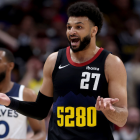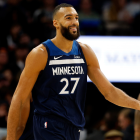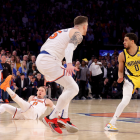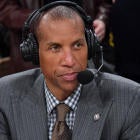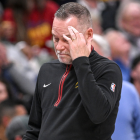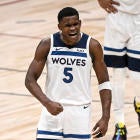NEW YORK -- Fred VanVleet has everybody's attention. The Toronto Raptors guard is not only a part of the best bench in the NBA and the league's best five-man unit, his coach counts on him in crunch time. When he made a game-winning jumper in the corner on national television last week, it shouldn't have been seen as surprising. As unlikely as it might seem for an undrafted, undersized floor general to emerge as a crucial part of the team that is tops in the East, VanVleet has spent his whole season showing that he belongs.
Per 36 minutes, VanVleet has averaged 15.2 points, 5.7 assists, 4.7 rebounds and 1.7 steals while making 39.4 percent of his 3s and pestering opposing guards on defense. He has become a fan favorite in Toronto, guaranteed himself a significant raise in free agency next summer, and, perhaps more important, inspired kids in his hometown of Rockford, Illinois.
After scoring 11 points on 4-for-5 shooting in 16 minutes in a 132-106 rout of the New York Knicks on Sunday, VanVleet talked to CBS Sports about the Raptors and his journey to this point. This Q&A has been lightly edited for clarity and flow.
You were on a Wichita State team where, even though you were undefeated, people would point to strength of schedule or point differential and say, "Maybe they aren't that good." Does this year with the Raptors kind of remind you of that, where you have a great record but not everyone is buying in?
Fred VanVleet: Yeah. I mean, same concept. You've just got to kind of decide what's important to you. Like, where your priority is. Is it what other people say? Is it the national media? You can always find something. So, if we get love in Canada -- OK, we're not getting in the states. Or whatever -- we got Charles Barkley saying he loves us, the other guys hate us. What are you going to choose to focus on? Honestly, we don't really pay attention to it that much. We know it's there. At the end of the day, when the playoffs come and we do what we're supposed to do, we'll get all the fame and glory that we can handle. So that's kind of the goal, is just to be a championship team. And we're not really worried about the accolades and the attention along the way.
Is it cool to be on a team that has an underdog mentality?
VanVleet: Yeah, it's great. I don't know if it's just because that's how I was brought up and that's how I came up, but I would prefer it that way. You can get lost in all the other stuff. You can forget what's important. But if you're the underdogs, you always got your eyes on the prize and locked in. You always have something to play for, with a chip on your shoulder, and you use that to your advantage.
You've been on record saying that when you first started getting minutes, people would look at you like, "Who's this guy? What's he doing here?" As the season has gone along, the scouting reports change, right? What's that like?
VanVleet: It's been a challenge. I think since the All-Star break, I've struggled a little bit shooting the ball. Part of that is just adjusting to people flying at me, running at me. Me being a focal point of the team's scouting report, I'm not surprising people anymore. Unless they're just stupid and don't do their homework, you know what I mean? I gotta get used to that and make my adjustments. It's part of the process.
Has it been different just in terms of attention? You go from being a star in college to here where you could usually sneak out of the locker room without talking to anybody. But you probably can't do that anymore.
VanVleet: Yeah it's different. It's phases, right? It wasn't like that when I first got to college. It took some time and then I built it up. My second year, I was doing a little bit more. And the same thing now. Last year, I didn't really do too much and this year it has grown. Obviously I'd prefer to just walk on out of here, without giving my piece, but that's just my natural personality. Whatever comes my way, I'll deal with it, and obviously as you play better and you get more exposure and more facial recognition, people start noticing who you are and you start to get that respect.
I know Kyle's [Lowry] been a mentor for you. Do you think about his career -- being a backup in multiple places, turning into a star -- as an example for you?
VanVleet: You try to draw as many parallels as you can. I followed Kyle his whole career. I know pretty much every stop he made. Then obviously meeting him, he's just extended a branch to me and he's been like a big brother since I got here. He's been so influential to me in terms of just giving me game on the court, off the court, life, money stuff, basketball. Obviously a guy like that, to go from where he came from to being a, whatever, four- or five-time All-Star, I'd be pretty smart to try to follow some of his footsteps. I'm just picking things that I can take, some things that I can't take, and my goal is to be better than him. He's giving me the tools to do some of the things he's doing now a little bit earlier. That's what I'm shooting for.
It's kind of a similar track. People doubted him, people thought he would top out at this or that …
VanVleet: They still do. And guys like that kind of gravitate towards each other. It's just a natural energy thing. People count you out, find something that's wrong with you, tell you you can't do stuff and you kind of just say, for the lack of a better word, 'F-- you.' And, 'I'm gonna show you better than I can tell you.' And that's what Kyle has done his whole career, is just prove people wrong. He continues to do it, and this year is not going to be any different.
Did you know coming into the year that all the bench guys would get to play? Because some people would have thought you and Delon [Wright] would be battling, and instead you guys play a ton together.
VanVleet: That was a pleasant surprise. I think collectively we knew that there would be opportunity. We didn't know what capacity or what it would look like, whether Kyle would be staggering his minutes, coming back and playing with the second unit, or whatever, DeMar [DeRozan] coming in at different times. But the way it's happened is everybody got better and everybody came into the season ready to go and I think the coaches took a hard look at that and said, "Hey, we might have something here." And they kind of rolled the dice and said, "Let's see what we got." They gave us an opportunity and we ran with it. We don't plan on giving it back anytime soon.
Is part of it the system? We talked about this months ago -- there's more opportunity for different guys to make plays. Not every system would necessarily allow you, Kyle and DeMar to close games and all be making plays.
VanVleet: Yeah, 100 percent. It's just a playmaker offense. If you can't make a play, you probably can't play. If you can, you can play any position as long as you can find somebody to defend on the other end. That's been good for us. Interchangeable pieces: that was probably the goal, right? If you looked at our offense and said, what's the main thing? It's ball movement, shooting 3s and interchangeable pieces. If you find guys who can move in between that offense and find their niche, then you've got guys that can play.
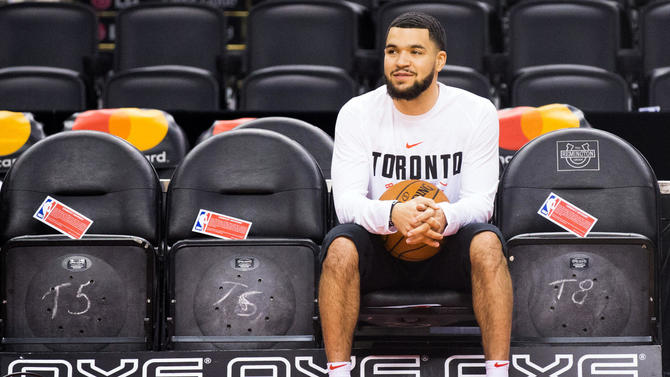
You've become a story because you were undrafted and you're now playing a big role. But when you think about how far you've come, coming from Rockford and making it out, is that a bigger deal than just overcoming going undrafted?
VanVleet: Yeah, I don't even think about the undrafted part because it has no bearing on anything. There's so many stories about guys who made it to the NBA without the draft. Overseas, whatever, call-ups. Mine is kind of like, you know, I just think about it like you said: life-or-death type stuff. Right? Like, making it out of my city. That's all I wanted to do, is go to college. I knew I wanted to go to the NBA, but at the time I'm trying to get away from the environment I was in. I'm trying to just make it out the city first and then we'll deal with everything else after that. So when I think about my journey, I think more about Rockford than being undrafted. That didn't really have any bearing on me because I don't put any stock into the draft. Because it doesn't favor a guy like me. And I know what I'm capable of. So it doesn't hold any weight for me.
Can you put into words for someone who didn't grow up in a place like that, just exactly how you did it?
VanVleet: I think honestly, without getting too deep, I'm a guy that has faith, right? I believe in a higher power. I won't get too much into that, but I also believe that most humans have an innate sense of right and wrong. And it just comes down to a decision-making process. Like, what's your decision-making process when you're in a situation? When you're in a f---ed-up environment, what decision are you going to make? Are you going to go this way or that way? Sometimes it's that simple. I made a lot of hard choices growing up, and my brothers made a lot of hard choices. My brothers took a lot of the hits for me. My dad, my mom, they took a lot of the hits for me and my family. A lot of people sacrificed for me. Nobody sacrificed more than me, obviously, but that's the biggest thing. You gotta sacrifice so much and just make so many critical decisions just to make it out of that situation. You know what I mean? And it's that simple sometimes.
But it's making those decisions every day, right?
VanVleet: It's all day. Every day. Mom and dad are working, are you going to get up to go to school? You don't have to go to school. You'll probably get your ass whooped if they find out you've been skipping, but you don't have to go. When you get to school, are you going to smoke weed before class? You know what I mean? Are you going to carry a gun to school or not?
When you say 'carry a gun,' that's something you saw.
VanVleet: Every day. We had kids wearing bulletproof vests to school. That's not uncommon. That's the norm around there. Like, are you going to get into fights or are you going to walk away? Me and my boys used to hang out, we used to get in a lot of shit together, but I was the one trying to break up everything. You know what I'm saying? Because I knew the implications. I'm not going to let somebody beat you up and you gotta see 'em every day -- that's going to lead to more stuff. But, like, it sounds easy when I'm thinking about it because I'm so used to it, but like, those type of little decisions are the difference. Are colleges going to recruit me when I've got little misdemeanor fights and weed charges on my record? Probably not, right? I'm gonna have to go JuCo or something like that.
Because you saw people do that.
VanVleet: Yeah, skipping school, mess your grades up, whatever. So I knew that I had to follow this path to get to college, which I wanted to do so my parents didn't have to pay for it. And then once you get to college, you're in a whole 'nother world. It's different choices there, too, but it's a little bit easier.
So is everything small potatoes now? Like when people ask you how you get over a rough shooting stretch or something, it's nothing?
VanVleet: Yeah, it's like whatever, I don't care. I've seen so much stuff growing up and seen a lot of things that kids shouldn't see. You get used to it. It's sad to say that, but at the end of the day, nobody is feeling sorry for you. You gotta find a way to make it happen.
Anything else you want to say about your journey?
VanVleet: It's been told so many times, I encourage people to look up just the history of Rockford and the stats. I don't talk about how terrible it is because I'm in the process of trying to make it better, but if you want a feel, just look up the numbers. They tell a very specific story of the city.
















